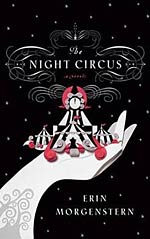
![]() everythinginstatic
everythinginstatic
3/20/2013
![]()
The circus arrives without warning. So begins Erin Morgenstern's novel about an unusual circus and the magical challenge within it. My previous encounter with a circus-based story was Bradbury's Something Wicked This Way Comes, which really did very little for me on a storytelling level, partly because the characters were so damn unlikeable.
The Night Circus comes with hefty recommendations, which is why it's so doubly disappointing. I went it, expecting a tale of magic, circuses and a shadowy challenge. Instead, I got a thinly-plotted novel that really wanted to be something big, but could only muster a weak romance. The setting is Victorian England (for the most part), and I swear Morgenstern picked it just so she could write about bowler hats and big dresses, because there is nothing remotely Victorian in the characters' behaviours, they act like modern men and women. The aesthetics are kind of there, but that's about it, and it seriously irritates me, because you either go full in, or you just don't specify the time-frame.
The language, despite being described as "dreamy", is really nothing to write home about. The circus itself is a great feat of imagination, but I do wish she'd kept it less grounded in reality, because by trying to pretend that it's partly real world engineering and partly magic, she completely breaks physics and make stuff sound ludicrous. It's a shame, too, because the ideas themselves are intriguing and different, and she does make Le Cirque des Reves sound like a great place to be.
Finally, the characters. This really was the nail in the coffin for me. Morgenstern tries to set Marco and Celia up as these powerful magicians, from two different schools of thought who, without any real interaction (for about half the novel, Celia's unaware that he's her opponent), fall madly in love and seek to avoid seeing the challenge through to the end. A second woman, Isobel, is brought in to serve as the final edge to a simpering love triangle. She's the one I seriously pitied the most, because not only does she get used and then discarded once Marco realises that Celia is actually his true love, she's also the only genuine person in the circus. So of course, she has to betray Marco, cause hey, we have to up the stakes somehow.
Overall, this seriously is a book that bothered me. I wanted to like it, and its only redeeming feature is the circus itself, and the varied tents that Morgenstern puts in. Beyond that, it's a shallow, trite romance novel, and I wish it had marketed itself that way, rather than relying on a gimmicky challenge and a flat, uninteresting cast.